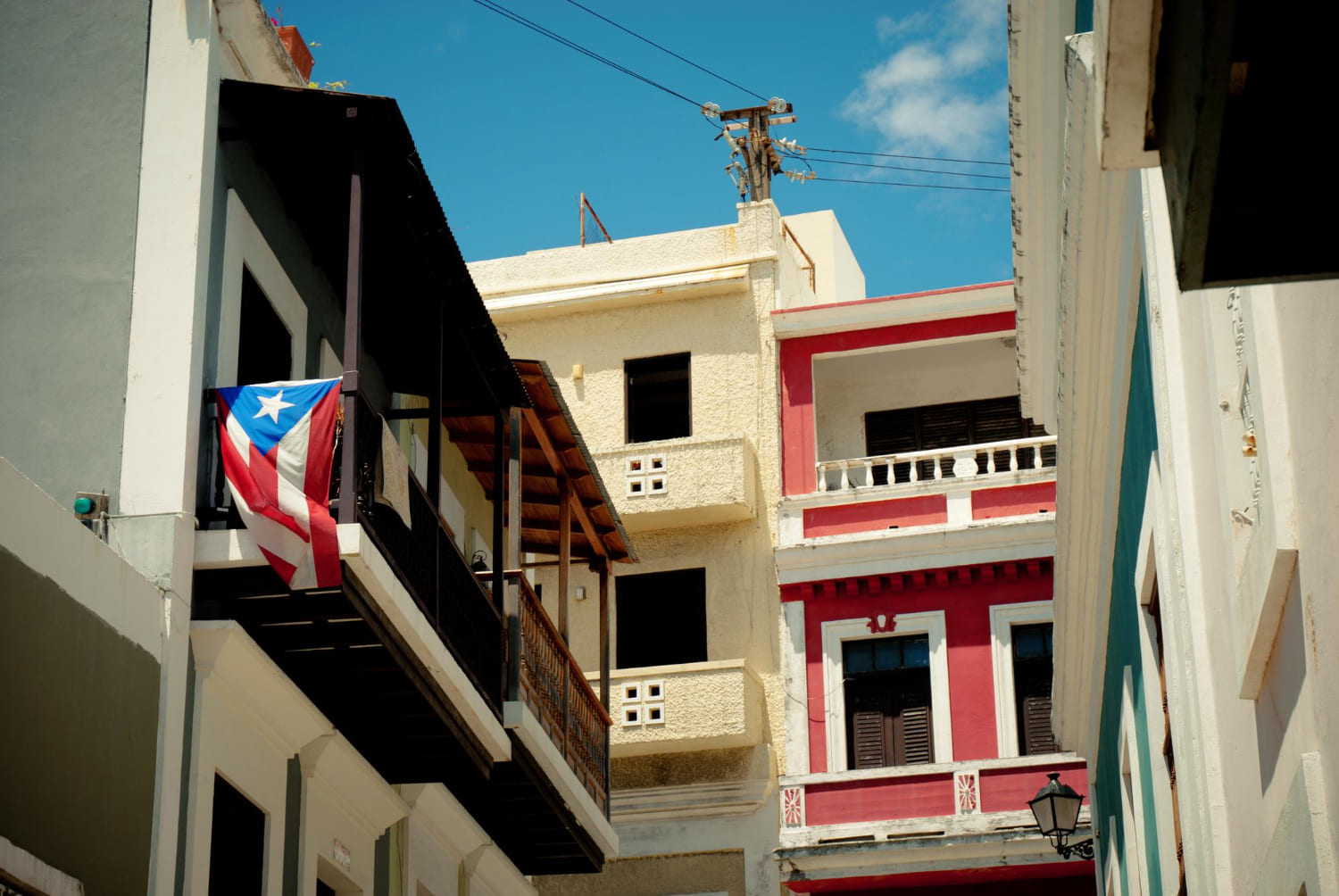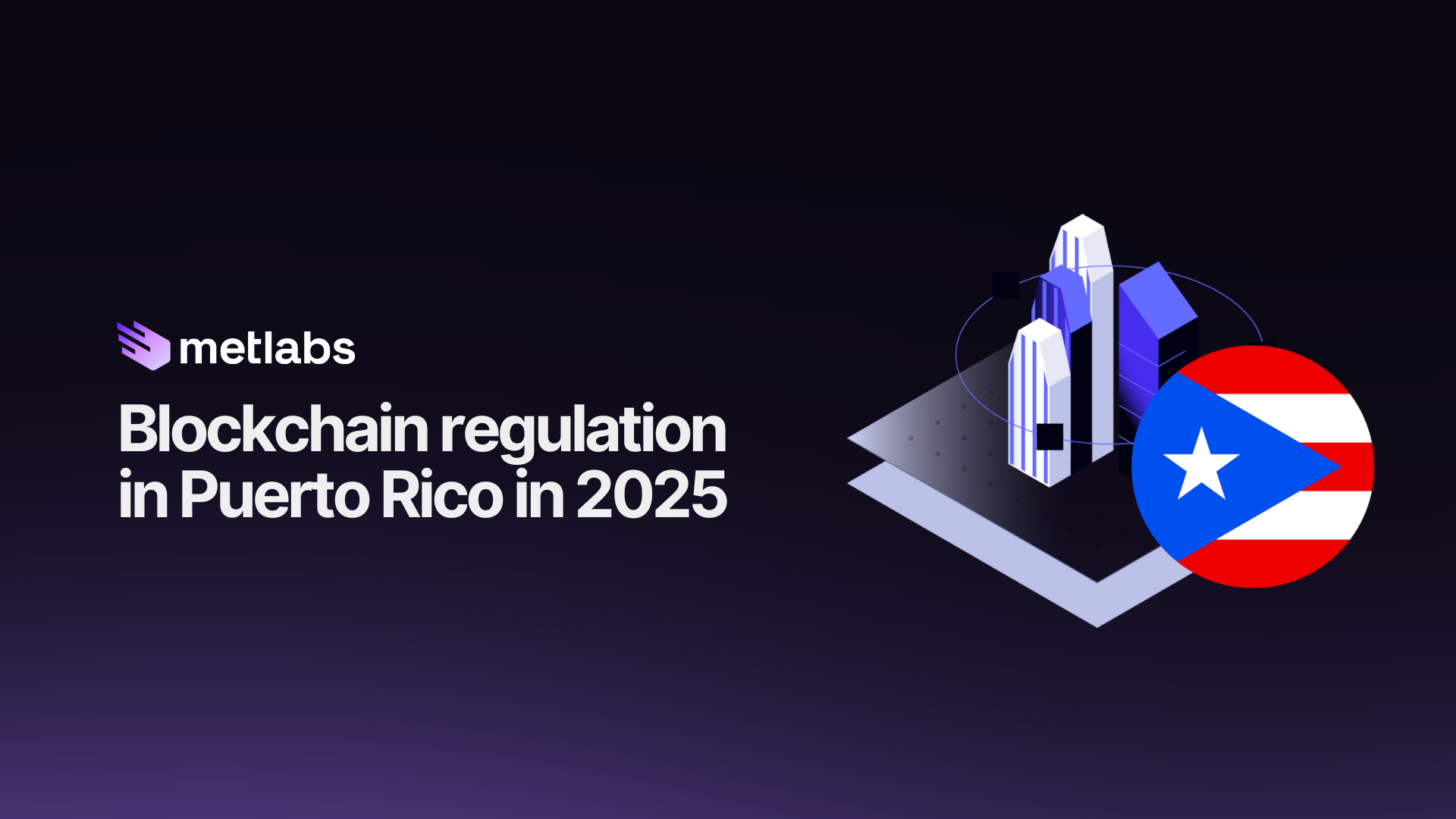The adoption of blockchain technology and asset tokenization is advancing at a rapid pace, but the real engine driving its global development is the existence of a clear, consistent and innovation-friendly legal framework.
Some countries have already established themselves as regulatory benchmarks, establishing specific rules for cryptoassets, DLT infrastructures and token issuance with legal backing. In this article we show you relevant information about blockchain regulation in Puerto Rico, which you can use as a guide if you are looking to operate internationally or evaluate different strategic locations.
What is the existing regulation in Puerto Rico?
Puerto Rico combines compliance with U.S. federal regulations with its own tax and regulatory framework. Virtual assets are regulated under the Bank Secrecy Act and state legislation, while Act 173-2019 drives the institutional adoption of blockchain. In parallel, Law 60-2019 offers attractive tax incentives for crypto companies. VASPs must register as MSBs with FinCEN and apply AML controls. In 2025, a new local regulatory framework under consultation seeks to consolidate Puerto Rico as a regional hub for virtual assets and tokenization.
2019 – Approval of Law 173-2019 on blockchain in the public sector.
2019 – Entry into force of Act 60-2019 (Puerto Rico Incentives Code).
2021 – Strengthening of AML obligations for VASP under federal regulations.
2025 – Public consultation to create a local regulatory framework for cryptoassets and tokenization.

Current legislation on blockchain and virtual assets in Puerto Rico
Act 173-2019 (Puerto Rico Office of Innovation and Government Information Act).
This law empowers the Office of Innovation and Information (PRITS) to promote the use of emerging technologies, including blockchain. It establishes the basis for the adoption of DLT solutions in government and facilitates the development of digital innovation projects. While it does not directly regulate virtual assets, it fosters an enabling environment for their institutional adoption.
Act 60-2019 (Puerto Rico Incentives Code)
Act 60-2019 unifies tax incentives applicable to technology-based companies, including blockchain and cryptoasset projects. It offers significant tax benefits for individuals and corporations establishing operations in Puerto Rico, which has attracted numerous players in the international crypto ecosystem. It does not establish specific prudential regulation on assets, but it does impact their tax treatment.
Bank Secrecy Act (BSA) and U.S. federal regulations.
As a U.S. territory, Puerto Rico is subject to the Bank Secrecy Act and FinCEN’s federal AML rules. VASPs on the island must register as a Money Services Business (MSB), implement AML/KYC programs, and report to FinCEN. In addition, in practice, they must comply with applicable U.S. federal frameworks for digital assets considered securities or commodities.
Proposed local regulatory framework (consultation 2025)
In 2025, a legislative project to create a specific framework for cryptoassets in Puerto Rico is under public consultation. It contemplates the local regulation of exchanges, issuers and custodians, and seeks to define the relationship between the local fiscal framework and current federal regulations. The proposal would also include guidelines for stablecoins and tokenization of real assets.
Tokenization makes it possible to digitally represent real-world assets through blockchain, but for it to have legal value, it is essential that there is a regulatory framework that recognizes this operation. Puerto Rico adopts its own approach, establishing specific rules for the issuance, custody or trading of tokens. In this block we explain how asset tokenization is regulated from a legal point of view, taking as an example an advanced jurisdiction such as Puerto Rico.
Regulation of asset tokenization in Puerto Rico
The development of asset tokenization in Puerto Rico is framed by a combination of U.S. federal regulations and the territory’s own tax and economic rules. Security tokens issued in Puerto Rico must comply with the federal Securities Act, including registration and compliance requirements if they qualify as securities. The issuance and custody of these tokens are also subject to SEC and FinCEN guidelines.
On the tax front, Act 60-2019 has made Puerto Rico an attractive destination for tokenization projects, allowing companies to establish operations with significant tax advantages. For the tokenization of non-financial assets, such as real estate, art or commodities, Puerto Rico’s private law applies, based on the local Civil Code and federal case law. Blockchain records are valid as a means of evidence, and initiatives such as the 2025 public consultation seek to establish a local regulatory framework for exchanges and tokenization projects, in coordination with federal frameworks.
Puerto Rico is emerging as a hybrid jurisdiction: with competitive tax advantages and access to U.S. financial markets, but with the ability to generate more flexible local regulations to attract blockchain projects.
Regulatory agencies and authorities for digital assets in Puerto Rico
Office of the Commissioner of Financial Institutions (OCIF)
The OCIF is the authority in charge of regulating financial entities in Puerto Rico. It supervises MSBs operating on the island, including exchanges and custodians of virtual assets. In addition, it establishes prudential supervision criteria for local entities with cryptoasset activities and coordinates with FinCEN in the application of AML/CFT regulations.
Puerto Rico Innovation and Technology Service (PRITS)
PRITS leads government initiatives for the adoption of emerging technologies, including blockchain. It oversees institutional digitization projects and collaborates with OCIF and the Department of Economic Development to foster innovation in the crypto industry. Although it does not license, its role is key in the development of the island’s technology framework.
Financial Crimes Enforcement Network (FinCEN)
As a U.S. territory, Puerto Rico is subject to federal regulation. FinCEN requires virtual asset service providers (VASPs) to register as a Money Services Business (MSB), implement AML/KYC controls, and report suspicious activity. FinCEN is working with OCIF to ensure effective implementation of these obligations on the island.
Internal Revenue Service (IRS)
The IRS oversees the taxation of cryptoassets in Puerto Rico. Although Act 60-2019 offers specific tax incentives for residents and institutions established on the island, cryptoasset transactions must comply with federal IRS obligations. Coordination with the Puerto Rican SAT is key to clarify income taxation.
Crypto Task Forces (IRS-CI, US Attorney PR, FinCEN)
Puerto Rico has joint task forces led by the IRS Cyber Crimes Unit (IRS-CI Caribbean) and the U.S. Attorney’s Office in San Juan (US Attorney PR). These units investigate cases of money laundering, tax fraud and financial crimes related to cryptoassets. Their activity has intensified in the face of the growing use of unregulated stablecoins and tokens.
Launching a business based on digital assets requires more than just technology: it is also necessary to comply with legal requirements such as licensing, registration and regulatory obligations. These conditions ensure that the business model is viable and sustainable over time, and that it complies with transparency and fraud prevention standards. In this section we explore what licenses are usually required and what compliance criteria blockchain companies operating in Puerto Rico must follow.

What licenses and requirements are needed to operate with cryptoassets in Puerto Rico?
MSB registration with FinCEN
Companies that offer exchange, custody or transmission of digital assets in Puerto Rico must register as a Money Services Business (MSB) with FinCEN. This implies implementing robust AML/KYC programs and complying with the reporting requirements established by federal regulations.
Compliance with OCIF requirements
In addition to federal registration, virtual asset service providers must comply with OCIF prudential requirements. These include governance requirements, cybersecurity controls and consumer protection policies in line with international best practices.
IRS Tax Compliance
Companies and individuals that operate with cryptoassets in Puerto Rico are subject to IRS tax obligations. This includes the correct reporting of income and gains derived from transactions with digital assets, with special attention to the tax effects differentiated by Act 60-2019.
AML/KYC Obligations
All VASPs in Puerto Rico must comply with AML/KYC obligations derived from the Bank Secrecy Act and federal legislation. This implies rigorous customer identification, continuous monitoring of transactions, suspicious activity reporting and cooperation with the competent authorities.
Types of tokens and their regulation in Puerto Rico
Securities (STO)
Security tokens issued in Puerto Rico are subject to U.S. federal regulations, mainly the Securities Act of 1933. The SEC requires that any token representing financial rights or participation in investments comply with registration requirements or be covered by valid exemptions. Platforms trading these tokens must be properly licensed.
Utility Tokens
Utility tokens are not regulated as securities if they do not generate expectations of financial benefit. However, the SEC may consider that a token qualifies as a security if it is offered for investment purposes. Issuers in Puerto Rico must perform a prior legal analysis to determine whether they require registration or exemption.
Stablecoins
Issuers of stablecoins in Puerto Rico must comply with federal regulations (Bank Secrecy Act) and register as MSBs with FinCEN. Although in 2025 there are proposals and discussions to establish a specific local framework on reserve transparency, auditing and consumer protection for stablecoins issued on the island, such framework has not yet been implemented and the effective regulation is still the federal one.
CBDCs
The United States has not yet launched an official CBDC and, since the 2024 federal executive order, the development of a CBDC is prohibited at the federal level. Puerto Rico, as a U.S. territory, does not participate in official Federal Reserve CBDC pilot programs. Any future CBDC would require a change in U.S. federal law.
NFTs
Artistic or collectible NFTs are not subject to specific regulation in Puerto Rico. However, if an NFT grants financial rights, future income or expectations of profitability, it may be considered a security by the SEC, and its issuance or commercialization would be subject to registration or exemption. In addition, the Treasury Department has proposed to include NFTs in the IVU (Sales and Use Tax), treating them as digital property for tax purposes.
DAOs and smart contracts
Puerto Rico does not yet have a specific local law for DAOs. Projects are usually structured as LLCs or other traditional entities. If a DAO issues tokens that qualify as securities, federal securities laws and AML/KYC obligations derived from the Bank Secrecy Act will apply.
Are you exploring developing your blockchain project in Puerto Rico?
At Metlabs we help companies like yours and offer comprehensive support in the development of blockchain projects and tokenization of assets such as real estate, carbon credits, commodities, intellectual property, financial instruments, franchises and more, fully aligned with blockchain regulation in Puerto Rico and international regulatory standards.
Contact us and find out how we can help you meeting all your business model needs, from technical validation and structuring to design, development and implementation of custom blockchain solutions, ready to scale from day one.



